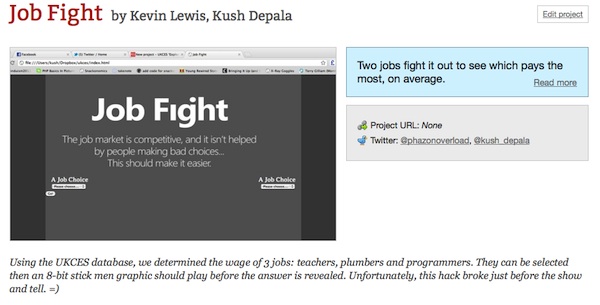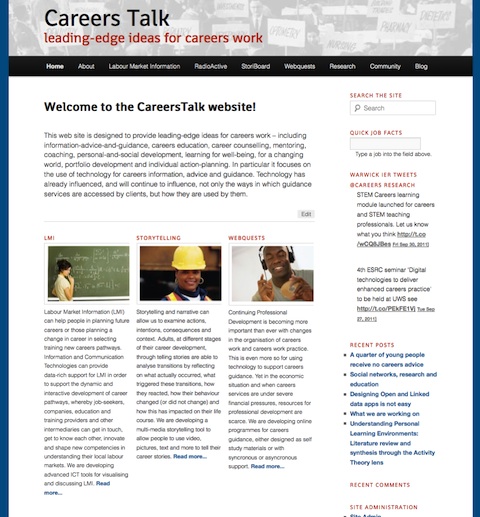What a difference the Creative Commons License makes.
According to the icould web site: “icould gives you the inside story of how careers work. The icould storytellers relate, in their own words, their real life career journeys. There are over a thousand easy to search,varied and unique career videos as well as hundreds of written articles. From telecoms engineers to police officers, from landscape gardeners to web designers, from engine drivers to zookeepers; they talk about what they do, what it’s like, how they came to be where are and their hopes for the future.”
The service has just celebrated its second birthday. A email from Director, Dave Arnold says:
Happy birthday to icould! We launched icould two years ago this week and although we are still in our infancy, we are growing well and becoming better known. We’ve doubled the visitor numbers to icould.com in the past year and also now have icould content streamed on key sites such as Guardian Careers, Career Wales, Skills Development Scotland, TES and the Frog schools learning platform, extending icould’s reach to millions of young people across the UK.
We’ve continued to add to our career videos and written content, with recent additions featuring advice on student finances and more practical tips for getting a first job. We’ve also created a new ‘Focus On’ area, designed to demystify certain sectors and types of work, exploring all the jobs and career possibilities within that theme. These Focus On areas consist of around eight to ten new video stories, new written content, competitions and specific guidance on training opportunities and company information.
Focus On Music was the first new area on icould.com sponsored by BlackBerry. Launched over the Summer, it looks at careers of people behind the stars in the music industry. Focus On Music profiles the unseen heroes behind a music star, for example Jesse J’s choreographer and music video director and Tinnie Tempah’s publicist and photographer. We wanted to show that you don’t have to be behind the microphone to have a successful career in the music industry and hopefully we give young people an insight into the breadth of careers within the industry. This area was launched in July and has attracted considerable media attention as well as several successful partnerships, one with the iconic NME which has resulted in an icould user being offered a work taster experience with the Editor. We have also created some new free teaching resources to complement this new initiative.
……..
We’ve recently launched the next area, a Focus On Finance sponsored by Standard Life, which looks at the range of careers and skills needed in the Financial sector, proving that you don’t have to be an expert with numbers to work in finance! We have a number of other areas in the pipeline, including a Focus on Media, which will launch in the New Year.
We continue to listen and respond to your feedback and are currently undertaking further research on the usage of icould.com to inform future developments. We really appreciate your input, so please keep your comments and suggestions coming in.”
Obviously icould is on a roll. But lets use the Wayback machine to take us back to spring, 2009. I don’ t know, but I suspect that at that time iCould was struggling to make much impact. And here is one of the major reasons why. The Terms and Conditions of use at that time stated:
“Use of the icould website
Unless otherwise stated, icould owns the intellectual property rights in the website and material on the website. All these intellectual property rights are reserved.
Unless otherwise stated, you are entitled to use the icould website for personal use in any way, providing you do not reproduce any of the information as your own and/or seek to profit from it. Personal use constitutes viewing the icould website online and printing pages and/or documents for review offline.
If you wish to reproduce any materials accessible on the icould website including information, graphics, images and other design elements in printed or electronic form, you must obtain written permission first. Please use the contact details at the bottom of this page if you need to obtain permission.
Linking to the icould website is permitted, although displaying our pages within a frame of another website is not as this constitutes reproducing our content as your own.”
Now let’s forward to the present day. Under Terms and Conditions we find the following statement:
“…..we give permission to use the contents of the Site on a creative commons licence which can be found at:
Attribution-Non-commercial-No Derivative Works 3.0 Unported
This licence gives you permission to broadcast icould.com pages over the school network or use them on a whiteboard in a classroom. You can circulate articles, use the worksheets and so on. This applies in any education or training context.
In simple terms:
- You can copy, distribute, transmit the work and display the material with the exclusion of full length versions[i] of stories.
- You may create derivative works with the exclusion of full length versions of stories.
Under the following conditions:
- Attribution: You must give icould credit and make clear the resources come from icould.com.
- Non-commercial: You may not use this work for commercial purposes or make any charge for the work.
- Share Alike. If you alter, transform, or build upon this work, you may distribute the resulting work only under a licence identical to the Creative Commons licence.
This means you could, for instance, create electronic worksheets or create electronic careers posters or include them in an e-portfolio or personal learning environment.”
Not only that, but icould provides an API key to make it easy for developers to incorporate icould materials in their own sites.
There is a lesson here for developers and content providers and indeed for many education and learning projects. Few of us have the clout to make it on our own. But through allowing use of our materials and projects we can build impact on a vastly greater scale. And whilst going creative commons closes off some business models it opens up others.
Congratulations to icould for opening up their content. And happy birthday. Lets hope they continue building on the success they are presently enjoying.



